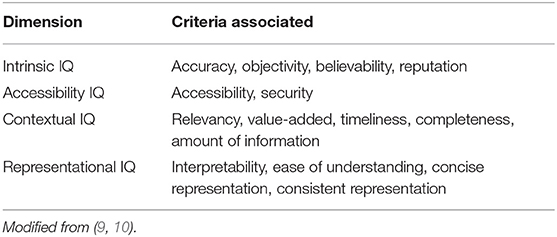Difference between revisions of "Template:Article of the week"
Shawndouglas (talk | contribs) (Updated article of the week text) |
Shawndouglas (talk | contribs) (Updated article of the week text) |
||
| Line 1: | Line 1: | ||
<div style="float: left; margin: 0.5em 0.9em 0.4em 0em;">[[File: | <div style="float: left; margin: 0.5em 0.9em 0.4em 0em;">[[File:Tab2 Al-Jefri FrontInMedicine2018 5.jpg|240px]]</div> | ||
'''"[[Journal: | '''"[[Journal:What Is health information quality? Ethical dimension and perception by users|What Is health information quality? Ethical dimension and perception by users]]"''' | ||
The popularity of seeking health [[information]] online makes information quality (IQ) a public health issue. The present study aims at building a theoretical framework of health information quality (HIQ) that can be applied to websites and defines which IQ criteria are important for a website to be trustworthy and meet users' expectations. We have identified a list of HIQ criteria from existing tools and assessment criteria and elaborated them into a questionnaire that was promoted via social media and, mainly, the university. Responses (329) were used to rank the different criteria for their importance in trusting a website and to identify patterns of criteria using hierarchical cluster analysis. HIQ criteria were organized in five dimensions based on previous theoretical frameworks, as well as on how they cluster together in the questionnaire response. We could identify a top-ranking dimension (scientific completeness) that describes what the user is expecting to know from the websites (in particular: description of symptoms, treatments, side effects). ('''[[Journal:What Is health information quality? Ethical dimension and perception by users|Full article...]]''')<br /> | |||
<br /> | <br /> | ||
''Recently featured'': | ''Recently featured'': | ||
: ▪ [[Journal:SCADA system testbed for cybersecurity research using machine learning approach|SCADA system testbed for cybersecurity research using machine learning approach]] | |||
: ▪ [[Journal:Semantics for an integrative and immersive pipeline combining visualization and analysis of molecular data|Semantics for an integrative and immersive pipeline combining visualization and analysis of molecular data]] | : ▪ [[Journal:Semantics for an integrative and immersive pipeline combining visualization and analysis of molecular data|Semantics for an integrative and immersive pipeline combining visualization and analysis of molecular data]] | ||
: ▪ [[Journal:A view of programming scalable data analysis: From clouds to exascale|A view of programming scalable data analysis: From clouds to exascale]] | : ▪ [[Journal:A view of programming scalable data analysis: From clouds to exascale|A view of programming scalable data analysis: From clouds to exascale]] | ||
Revision as of 15:22, 29 April 2019
"What Is health information quality? Ethical dimension and perception by users"
The popularity of seeking health information online makes information quality (IQ) a public health issue. The present study aims at building a theoretical framework of health information quality (HIQ) that can be applied to websites and defines which IQ criteria are important for a website to be trustworthy and meet users' expectations. We have identified a list of HIQ criteria from existing tools and assessment criteria and elaborated them into a questionnaire that was promoted via social media and, mainly, the university. Responses (329) were used to rank the different criteria for their importance in trusting a website and to identify patterns of criteria using hierarchical cluster analysis. HIQ criteria were organized in five dimensions based on previous theoretical frameworks, as well as on how they cluster together in the questionnaire response. We could identify a top-ranking dimension (scientific completeness) that describes what the user is expecting to know from the websites (in particular: description of symptoms, treatments, side effects). (Full article...)
Recently featured:










